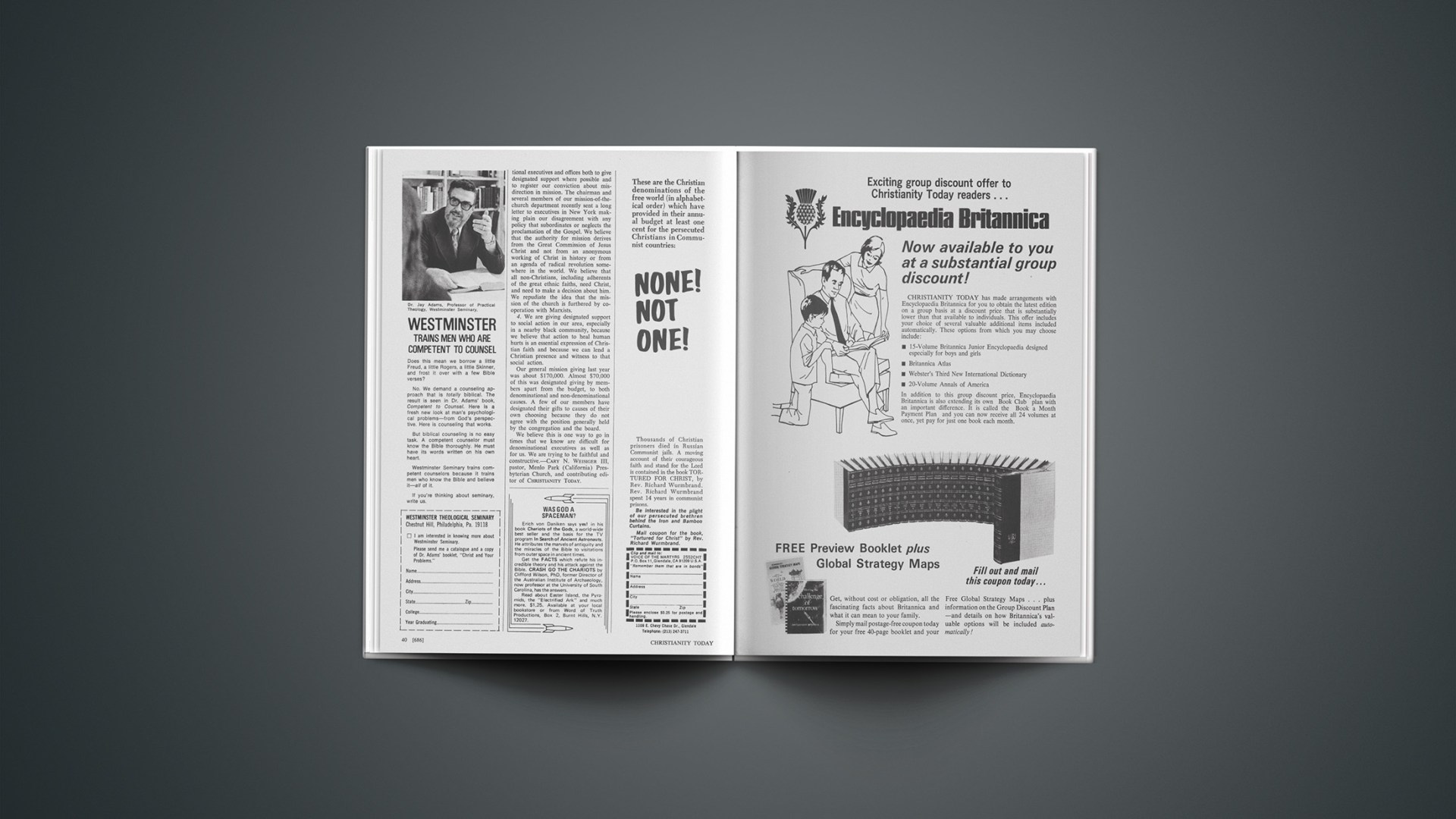AS PASTOR OF a mainstream denominational church in the suburbs of a large city, I feel like the man in the television ad balancing himself with a long pole on a wire stretched atop a car going along a bumpy road.
Many other evangelical ministers and members in connectional churches will know just what I mean by this. We are trying hard to strike a balance between loyalty to denomination and loyalty to conscience. The current crisis in mission makes this a difficult feat.
Generally speaking, the members and officers of our congregation have respect for denominational processes and responsibilities. Our elders go faithfully to denominational meetings at all levels. Many have been unhappy in the last ten years with what they feel have been extreme pronouncements and actions by the higher judicatories. But no one is talking about breaking away; no one is advocating schism. Pressure comes at the point of supporting the general mission of the higher judicatories. The competition of worthy causes for benevolence dollars has become so great that the mission policy of our local church has undergone drastic revision.
For most of my years in the ministry I had a deep conviction about urging the congregations I served to support the denomination’s unified budget. Although I could not agree with all programs of all the boards, and although critics cited unfaithfulness or heresy in places, I felt it was a duty for people of confessional or evangelical convictions to give a witness of generous stewardship. I think most of the elders and members in my present congregation felt the same way about the matter.
We have changed. In the last decade, for example, we have felt the impact of student revolt at nearby colleges and universities, and we have reacted against what we felt was incredible compromise and weakness on the part of interdenominational ministries at those places. When one of the campus ministers at a neighboring university finally stated that he was a Marxist, a Leninist, and a Maoist, he was let go by the interdenominational board not because he was ideologically unacceptable but for “lack of funds.” Our governing board had discontinued program support two years before.
This weakness in student ministry is only a symptom of denominational and ecumenical disease. The real crisis in mission as it affects the World Council of Churches, the National Council of Churches, and many of the established denominations is theological.
The question is this: Is it the mission of the Church to humanize society by changing social and political structures even to the point of encouraging violent revolution, or to evangelize society by proclaiming the Gospel of Jesus Christ, by planting churches, and by maintaining a soul-winning goal in the midst of social action?
Our board and congregation are committed to four principles:
1. We designate all our mission dollars in accordance with certain options for giving established two years ago at the annual meeting of the denomination. Under “Option Three” a congregation gives to a mission institution or objective of the denomination with the understanding that any excess received over the budgeted amount is redirected in consultation with the congregation. “Option Four” giving goes through the denominational treasury as an “over-and-above” gift, with nothing siphoned off into a general fund. About one-third of our budgeted giving is under Opinion Three.
2. We are studying the mission situation generally and specifically. My people recently survived a series of seven sermons I preached on the Frankfurt Declaration, written three years ago by Dr. Peter Beyerhaus and others in Germany (see June 19, 1970, issue, page 3). Our elders engage in much conversation and correspondence with workers on fields inside and outside the United States.
3. We are working with denominational executives and offices both to give designated support where possible and to register our conviction about misdirection in mission. The chairman and several members of our mission-of-the-church department recently sent a long letter to executives in New York making plain our disagreement with any policy that subordinates or neglects the proclamation of the Gospel. We believe that the authority for mission derives from the Great Commission of Jesus Christ and not from an anonymous working of Christ in history or from an agenda of radical revolution somewhere in the world. We believe that all non-Christians, including adherents of the great ethnic faiths, need Christ, and need to make a decision about him. We repudiate the idea that the mission of the church is furthered by cooperation with Marxists.
4. We are giving designated support to social action in our area, especially in a nearby black community, because we believe that action to heal human hurts is an essential expression of Christian faith and because we can lend a Christian presence and witness to that social action.
Our general mission giving last year was about $170,000. Almost $70,000 of this was designated giving by members apart from the budget, to both denominational and non-denominational causes. A few of our members have designated their gifts to causes of their own choosing because they do not agree with the position generally held by the congregation and the board.
We believe this is one way to go in times that we know are difficult for denominational executives as well as for us. We are trying to be faithful and constructive.—CARY N. WEISIGER III, pastor, Menlo Park (California) Presbyterian Church, and contributing editor of CHRISTIANITY TODAY.










